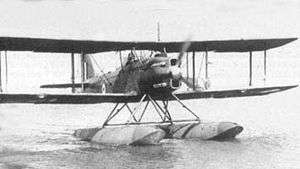Fairey Seafox
| Seafox | |
|---|---|
 | |
| Role | ship-borne reconnaissance seaplane |
| National origin | United Kingdom |
| Manufacturer | Fairey Aviation |
| First flight | 27 May 1936 |
| Introduction | 23 April 1937 |
| Retired | 1943 |
| Primary user | Royal Navy (Fleet Air Arm) |
| Number built | 66 |
The Fairey Seafox was a 1930s British reconnaissance floatplane designed and built by Fairey for the Fleet Air Arm. It was designed to be catapulted from the deck of a light cruiser and served in the Second World War. Of the 66 built, two were finished as landplanes.
Design and development
The Fairey Seafox was built to satisfy Air Ministry Specification S.11/32. The first of two prototypes appeared in 1936, first flying on 27 May 1936,[1] and the first of the 64 production aircraft were delivered in 1937.[2] The flights were organised as 700 Naval Air Squadron of the Fleet Air Arm.
The fuselage was of all-metal monocoque construction, the wings being covered with metal on the leading edge, otherwise fabric. It was powered by a 16-cylinder 395 hp (295 kW) air-cooled Napier Rapier H engine. It cruised at 106 mph (171 km/h), had a range of 440 mi (710 km).
Although the Seafox handled well, it was criticized for being underpowered, engine cooling was poor and landing speeds were higher than desired.
Operational history
In 1939, a Seafox played a part in the Battle of the River Plate against the German pocket battleship Admiral Graf Spee, by spotting for the naval gunners. This ended with Graf Spee's scuttling and destruction.
Seafoxes operated during the early part of the war from the cruisers HMS Emerald, Neptune, Orion, Ajax, Arethusa and Penelope and the armed merchant cruisers HMS Pretoria Castle, Asturias and Alcantara. They remained in service until 1943.
Operators
Specification
Data from Fairey Aircraft since 1915 [3]
General characteristics
- Crew: two
- Length: 33 ft 5 in (10.19 m)
- Wingspan: 40 ft 0 in (12.20 m)
- Height: 12 ft 2 in (3.71 m)
- Wing area: 434 ft² (40.3 m²)
- Empty weight: 3,805 lb (1,730 kg)
- Loaded weight: 5,420 lb (2,464 kg)
- Powerplant: 1 × Napier Rapier VI piston, 395 hp (295 kW)
Performance
- Maximum speed: 124 mph (108 knots, 200 km/h) at 5,860 ft (1,787 m)
- Cruise speed: 106 mph (92 knots, 171 km/h)
- Range: 440 mi (383 nmi, 710 km)
- Service ceiling: 9,700 ft (2,960 m)
- Endurance:4.25 hours
- Climb to 5,000 ft (1,520 m): 15.5 min
Armament
- 1 x 7.7mm machine gun
See also
Aircraft of comparable role, configuration and era
Related lists
References
Notes
Bibliography
- "For Light Reconnaissance" (PDF). Flight, 9 December 1937. pp. 570–574.
- Mondey, David. The Hamlyn Concise Guide to British Aircraft of World War II. London; New York: Aerospace Publishing Ltd., 1982. P.87. ISBN 0-600-34951-9, ISBN 0-600-34967-5.
- Taylor, H.A. Fairey Aircraft since 1915. London: Putnam, 1974. ISBN 0-370-00065-X.
External links
| Wikimedia Commons has media related to Fairey Seafox. |
- Fairey Seafox – British Aircraft of World War II